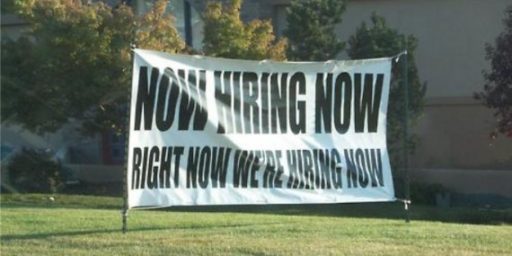Disappointing Job Growth
One of the things that I find somewhat annoying is how President Bush talks about a strong economy. Granted we are not in a recession, but when you have job growth like this it just isn’t all that good.
Total nonfarm payroll employment increased by 110,000 in March, and the unemployment rate declined to 5.2 percent, the Bureau of Labor Statistics of the U.S. Department of Labor reported today. Several industries added jobs over the month, including construction, mining, health care, and wholesale trade.
Yes, the decline in the unemployment rate is a good thing, but payroll job growth should normally be quite a bit larger, like 2.5 to 3 times larger. So the economy isn’t bad, but it sure isn’t great either.
Update: Kash at Angry Bear is even more pessimistic. Can’t say as I blame him. The recession has been over since November 2001 and payroll job growth has been quite disappointing since then.





Pessimism is a moral stance not an intellectual one … the economy is GROWING … yes, there are problems but the net indicator remains positive (GDP is positive)… let’s not focus on the bad signs at the expense of the entire picture … unfortuately be a “bear” is genetic not intellectual
I agree with you. I’m a staunch conservative (socially and fiscally) but I think Bush is clueless with regards to the economy. And Mankiw was a moron. Most distressing for me is the flight of jobs going overseas. Having already lost one job to offshoring, I am very concerned about the future of the middle class. Accounting, finance, manufacturing, IT, and now pharma jobs are all starting to go overseas (or have already gone overseas). These jobs aren’t coming back. Pretty soon, we’ll be a country full of food service workers and nearly all the good jobs will be gone for good.
Am I pessimistic? You better believe I am. Now I know that we live in a global economy, but we shouldn’t gleefully send our middle class overseas while we are facing closed markets and trade barriers in the countries we’re now enriching. The very LEAST we should get is a fair and (FULLY) free marketplace in which to sell our wares. We’re not even getting that.
I’m not a troll. I’m more conservative and more Republican than Bush. I voted for him because I approve of his actions in the war on terror and that (to me) trumps economic issues. I voted for him in spite of his incompetence on economic issues. I only hope we can right the ship on the economy before it’s too late.
More access to overseas markets isn’t going to help much if the people there can’t afford to buy the products of expensive American labor. And American labor is expensive partly because the currency is still strong compared to many Asian currencies. But if the currency weren’t strong we would have high inflation, barring some miracle energy source and serious improvement in actual manufacturing productivity. The simple fact of the matter is that you can have a strong currency with trade barriers and high inflation, a strong currency without trade barriers and low inflation, or a weak currency without trade barriers and high inflation.
It is possible to reduce some of the costs of goods produced by US based manufacturers, by changing taxation schemes. Replacing payroll taxes with a sales tax and reducing corporate income taxes could boost American manufacturers. Of course this won’t go over well with certain groups because of it who would be hurt and who would be helped.
ATM, you make some valid points. However, American products do get sold in third-world countries. They are sold at third-world market prices, though. We still have to pay first-world prices. The offending companies are moving to third-world payrolls and are still charging us first-world prices. This is how they (partially) plan to increase their profit margins. However, as more and more companies take away jobs from US workers, the average salaries and average disposable incomes in the US will continue to drop. This will help prevent inflation and should even eventually drive prices down as spending power drops here. That’s only theoretical, though. I don’t know if prices ever would really drop (they may be contained, but not decreased).
So…fully free and open markets could help at least some (even if the revenues are modest due to low market-based prices in free third-world markets). Still, it should be demanded to help even out the playing field.
Also, I think John Kerry is true and utter dud, but I agree with him that we SHOULD ABSOLUTELY NOT be giving tax breaks that encourage companies to move jobs overseas. That is treachery as far as I’m concerned.
As far as taxes go, I’m always for lower taxes. But I think that corporate tax breaks or tax elimination should be tied to job creation (in the US) or some other expenditure that will truly fuel the economy and benefit our country (as opposed to further enriching unscrupulous executives).
I feel that, because money fuels politics and because corporations buy access and favors through political donations, the working stiff will always get the shaft. The Republicans and Democrats are both soiled by this inequity. I guess I’m more Libertarian in this respect. I just don’t see a way out of this business/political morass we’ve created in this country though.
But I digress…